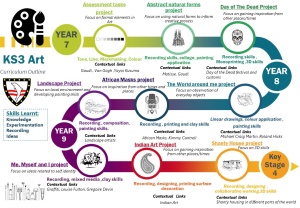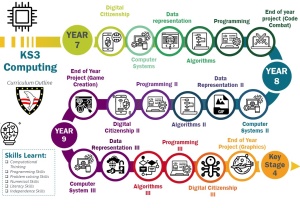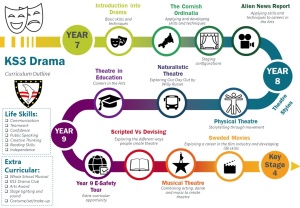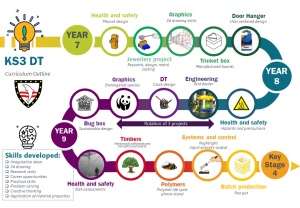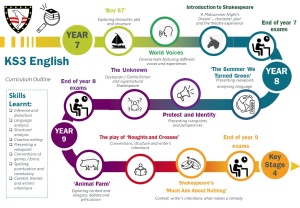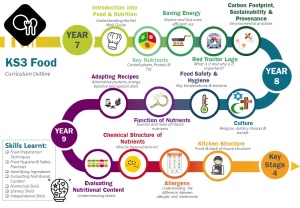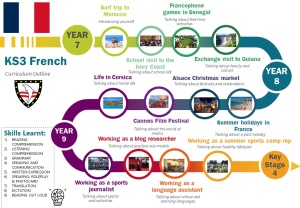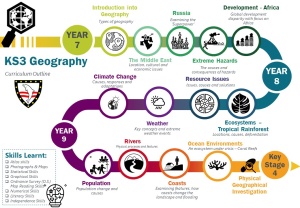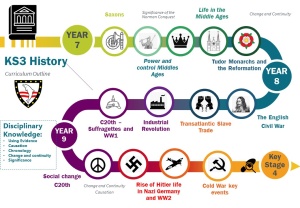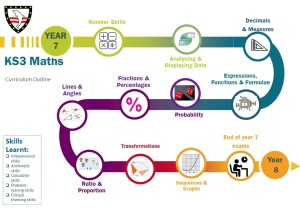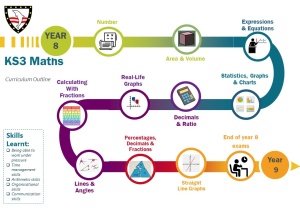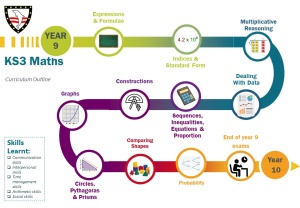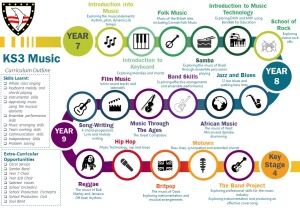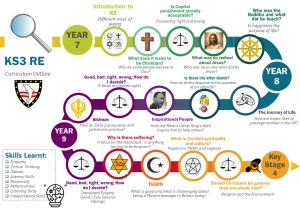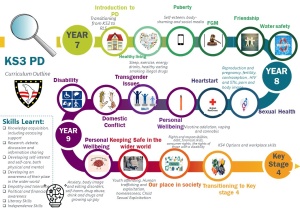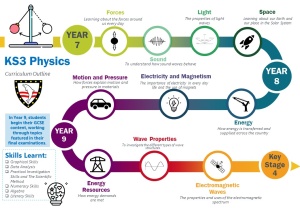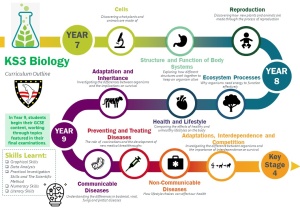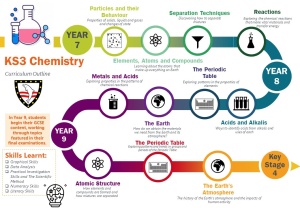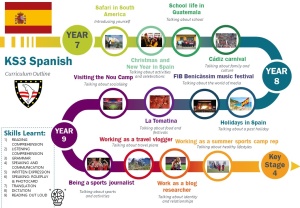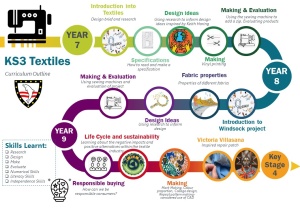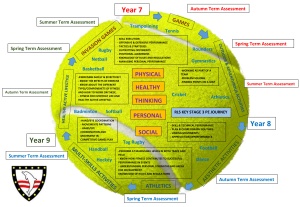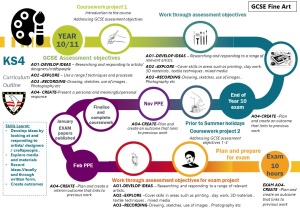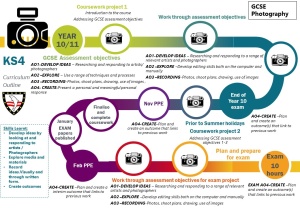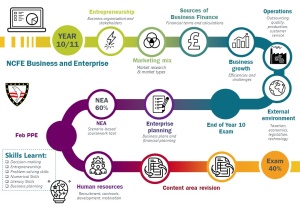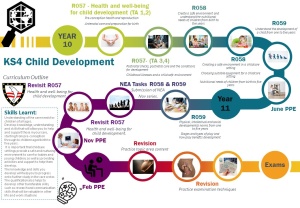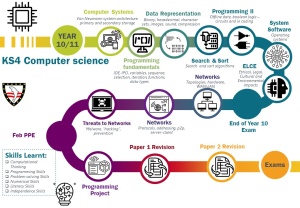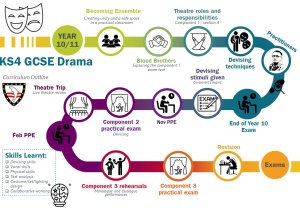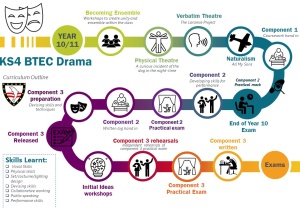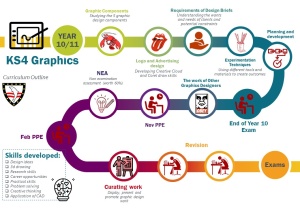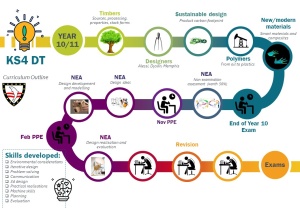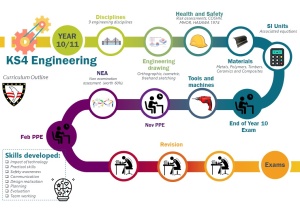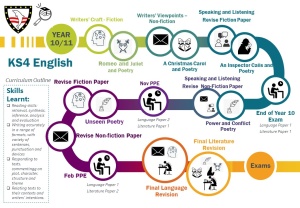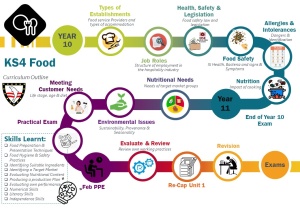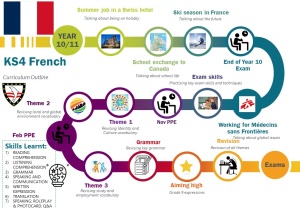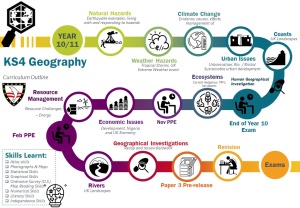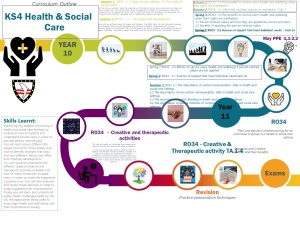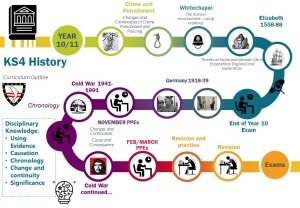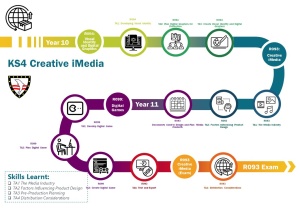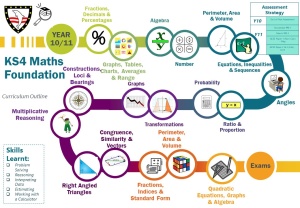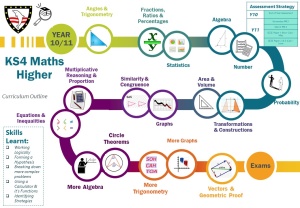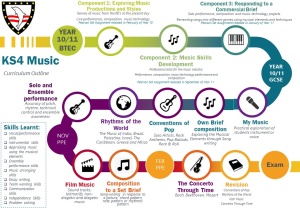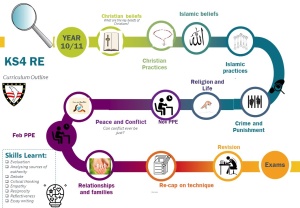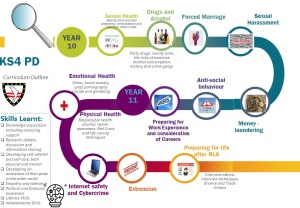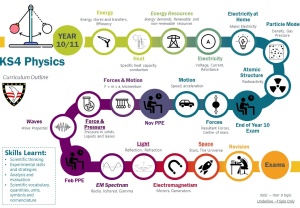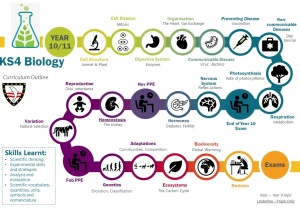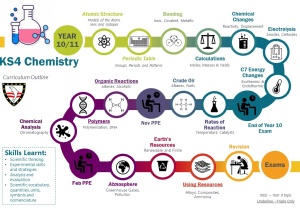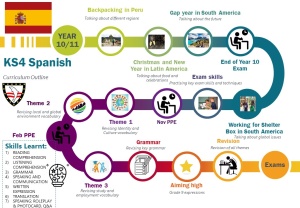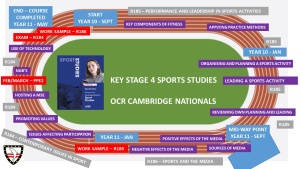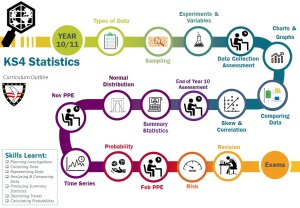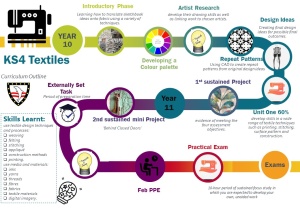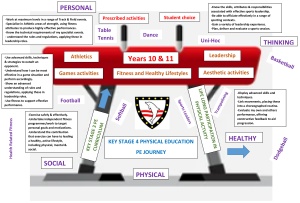Curriculum
We want to enable all our students to become:
- Successful learners, who strive to reach their potential in all they do
- Confident learners, who develop a fine sense of identity and self-worth
- Responsible citizens, well prepared for life and work and keen to make a positive difference to the world they live in
The aim of our curriculum is to ensure that all students grow in confidence whilst achieving the highest of standards in relation to student progress, allowing them then to succeed at college, university and beyond. Within this broad framework, we focus on enabling our students to develop knowledge, understand concepts and acquire skills, and be able to choose and apply these in relevant situations.
Mrs Clare Beech, Deputy Headteacher, is our overall lead for curriculum.
The Curriculum Overviews and Statements of Intent are designed to give parents a broad picture of what their child will be studying during each term, together with the rationale behind it.
Each department and subject then work from detailed schemes of work providing consistency of teaching and experience across all classes.
Our curriculum for Years 7, 8 and 9 is broad and balanced, enabling students to develop key literacy and numeracy skills, develop their wider learning skills and to experience a range of exciting curriculum opportunities.
Our grouping policy means that in Maths, students will be broadly set on entry in Year 7, which then drives the setting for some other subject areas. As students move though Key Stage 3, other subjects may group students by ability such as in Science, Humanities, Modern Foreign Languages and Physical Education. This means the needs of all students can be met. More able students will be able to learn at a pace and level of challenge which meets their needs and students who need to focus on key skills will be given the extra support and smaller class sizes to enable them to access the curriculum and to succeed.
Our Key Stage 3 curriculum allows students to study the following subjects, as per the requirements of the National Curriculum:
Curriculum Overview – Year 7 20252026
Curriculum Overview – Year 8 20252026
Curriculum Overview – Year 9 20252026
Curriculum Overview Computing 2526
Curriculum-Overview-Design-Technology 2526
Curriculum Overview DT Food 2526
Curriculum Overview Drama 2526
Curriculum Overview English 2526
Curriculum Overview French 2526
Curriculum Overview Geography 2526
Curriculum-Overview-History 2526
Curriculum Overview Maths 2526
Curriculum Overview Music 2526
Our commitment to a broad and balanced curriculum continues into Key Stage 4.
During Year 9 we work closely with students and their parents through the options process, so they are able to choose a Key Stage 4 course which plays to their interests and strengths and ensures clear post-16 progression. This is a very important process, as students respond well to a more individualized, challenging and engaging curriculum which enables them to achieve of their best.
We provide a curriculum that offers breadth, balance and opportunity. The choices available for students are flexible, thereby allowing for personalisation by addressing students’ interests, abilities and aspirations.
We also incorporate the Government’s latest plans for the 14 – 19 curriculum. Students have the chance to follow both GCSE and vocational courses, where appropriate.
Many of our students also opt to take further GCSEs in one or two weekly after school sessions as a twilight. This particularly appeals to our more able students who want to add an extra qualification to their portfolio.
For a Key Stage 4 curriculum overview for each subjects, please consult the back sections of these documents.
Curriculum-Overview-Business-Studies 2526
Curriculum Overview Computing 2526
Curriculum-Overview-Design-Technology 2526
Curriculum Overview DT Food 2526
Curriculum Overview Drama 2526
Curriculum Overview English 2526
Curriculum Overview French 2526
Curriculum Overview Geography 2526
Curriculum-Overview-Health-and-Social-Care 2526
Curriculum-Overview-History 2526
Curriculum-Overview-I-Media 2526
Curriculum Overview Maths 2526
Curriculum Overview Music 2526
Curriculum Overview Science 2526
Curriculum Overview Spanish 2526
In some subjects setting may support accelerated progress, whilst others achieve greater success when students are grouped in mixed ability classes.
The following information explains the setting structure for our core departments in Key Stages 3 & 4.
When writing the timetable there is often a necessity within a year group to schedule different subjects to be taught at the same time. This is most common in Year 7 where, for example, maths drives the setting for science, Computing and PD this year; whilst English drives the setting for French, Spanish, humanities, RE and the creative arts.
All departments assess students at various points throughout the school year. Although we try to keep set changes to a minimum, we may feel that we need to move your child up or down a set to extend or support their progress further.
Maths – Head of Department: Mr Duncan Moulder
Years 7 – 9 (Key Stage 3)
Students are set on entry in to Richard Lander School based on the information received from primary school as well as their SATs results. Setting in Year 7 is then fine-tuned following a baseline assessment in the first half-term. Subsequent set movements occur at the end of each academic year. However, if a student is identified during the school year as someone who would benefit from working in a different set, we do make allowances for this. This may also affect their setting in other subjects, dependent on the school timetable.
As in previous years, the class name will consist of the year group and the side of the year that your child is placed in (L or R). All students in Key Stage 3 year groups will work on the same topic at the same time. But the depth into which they will go will vary. The table below shows what scheme of work each Key Stage 3 class will be studying:
| Set name | Scheme of work depth |
| 7L1, 7R1, 7L2, 7R2 | Students will study to a greater depth in each unit of work |
| 7L3, 7R3, 7L4, 7R4, 7L5, 7R5 | Students will study core concepts in each unit of work |
| 7L6, 7R6 | Students will work on basic concepts in each unit of work |
| 8L1, 8R1, 8L2, 8R2 | Students will study to a greater depth in each unit of work |
| 8L3, 8R3, 8L4, 8R4, 8L5, 8R5 | Students will study core concepts in each unit of work |
| 8L6, 8R6 | Students will work on basic concepts in each unit of work |
| 9L1, 9R1, 9L2, 9R2 | Students will study to a greater depth in each unit of work |
| 9L3, 9R3, 9L4, 9R4, | Students will study core concepts in each unit of work |
| 9L5, 9R5, 9L6, 9R6 | Students will work on basic concepts in each unit of work |
Years 10 & 11 (Key Stage 4)
The decision of which tier of entry a student should be entered for at the end of Year 11 is only finally decided in March of Year 11. Until that time, we work on the following assumptions.
Students in sets 1 to 2 will be learning higher tier work appropriate to their ability and students in sets 4 to 7 will be learning foundation tier work appropriate to their ability. Students in set 3 will cover higher tier work. Whilst historically the vast majority of set 3 students take the higher tier, students may be selected to take the foundation tier if the more complex higher tier content proves too difficult for them. We will identify this through our termly assessments. We also identify students in set 4 that may be capable of higher tier. We must do this by the Spring term of Year 10 to ensure that they are able to catch up on any units missed.
The table below shows what scheme of work each Key Stage 4 class will be studying:
| Set name | Tier of entry |
| 10P1, 10Q1, 10P2, 10Q2 | Higher |
| 10P3, 10Q3 | Most likely Higher |
| 10P4, 10Q4, 10P5, 10Q5, 10P6, 10Q6, 10P6P | Foundation |
| 11P1, 11Q1, 11P2, 11Q2 | Higher |
| 11P3, 11Q3 | Most likely Higher |
| 11P4, 11Q4, 11P5, 11Q5, 11P6, 11Q6, 11P6P | Foundation |
English – Head of Department: Mrs Anya Cant
Years 7 – 9 (Key Stage 3)
Years 7, 8 and 9 are taught in mixed ability groups throughout the school year.
| Name | Setting |
| 7LA, 7LU, 7LT, 7LH, 7LO, 7LR | Mixed ability groups |
| 7RA, 7RU, 7RT, 7RH, 7RO, 7RR | Mixed ability groups |
| 8LA, 8LU, 8LT, 8LH, 8LO, 8LR | Mixed ability groups |
| 8RA, 8RU, 8RT, 8RH, 8RO, 8RR | Mixed ability groups |
| 9LA, 9LU, 9LT, 9LH, 9LO, 9LR | Mixed ability groups |
| 9RA, 9RU, 9RT, 9RH, 9RO, 9RR | Mixed ability groups |
Year 10 (Key Stage 4)
Year 10 students are taught in mixed ability groups throughout the school year. English Language and English Literature are both assessed through a single tier of entry, meaning all students are prepared to sit the same exam.
Year 10 groupings follow the pattern below for the academic year 2025/2026:
| Name | Setting |
| 10PD, 10PO, 10PL, 10PP, 10PH, 10PI, 10PN | Mixed ability groups |
| 10QL, 10QA, 10QN, 10QD, 10QE, 10QR | Mixed ability groups |
Year 11 (Key Stage 4)
Year 11 students are taught in mixed ability groups throughout the school year. English Language and English Literature are both assessed through a single tier of entry, meaning all students are prepared to sit the same exam.
Year 11 groupings follow the pattern below for the academic year 2025/2026:
| Name | Setting |
| 11PD, 11PO, 11PL, 11PP, 11PH, 11PI, 11PN | Mixed ability groups |
| 11QL, 11QA, 11QN, 11QD, 11QE, 11QR | Mixed ability groups |
Science – Head of Department: Ms Nicky Steen
Year 7, 8 & 9
These sets are the same as the maths groups. Students in Year 9 will be studying the GCSE course. All students will study the same content (there are not separate courses for higher/foundation or core/triple science).
Year 10
| Class name | Setting |
| 10PA, 10PB, 10QA, 10QB | Triple Science |
| 10P1, 10Q1, 10P2, 10Q2 | Combined Science – higher tier |
| 10P3 | Combined Science- mixed tiers |
| 10Q3, 10P4, 10Q3P, 10P4P | Combined Science – foundation tier parallel classes. |
Combined Science groups are set according to their Year 9 science assessment data, set changes may occur during the year. Final tier of entry decisions are made during Year 11.
Year 11
| Class name | Setting |
| 11PA, 11PB, 11QA, 11QB | Triple Science |
| 11P1, 11Q1, 11P2, 11Q2 | Combined Science – higher tier |
| 11P3 | Combined Science- mixed tiers |
| 11Q3, 11P4, 11P4P, 11Q3P | Combined Science – foundation tier parallel classed |
Combined Science groups are set according to their Year 9 science assessment data, set changes may occur during the year. Final tier of entry decisions are made during Year 11.
Humanities, MFL and Creative Arts
Year 7, 8 & 9 Humanities, MFL and Creative Arts lessons are set with English and are therefore mixed ability.
Our Year 7 Humanities, MFL and Creative Arts classes are:
French: 7LA, 7LU, 7LT, 7LH, 7LO, 7LR
Spanish: 7RA, 7RU, 7RT, 7RH, 7RO, 7RR
The Modern Foreign Language studied in Year 7 will continue to be studied in Years 8 & 9.
In MFL, all Year 7 classes follow the same course books and teachers deliver appropriate material for the ability of the students
Our Year 8 Humanities, MFL and Creative Arts classes are:
French: 8LA, 8LU, 8LT, 8LH, 8LO, 8LR
Spanish: 8RA, 8RU, 8RT, 8RH, 8RO, 8RR
In MFL, from Year 8 onwards, the teachers will choose material from both the Higher and the Foundation versions of the course, as appropriate for the students. This allows plenty of choice to differentiate to meet individual needs. This is especially important in Year 9, where we start delivering the GCSE course.
Our Year 9 Humanities, MFL and Creative Arts classes are:
French: 9LA, 9LU, 9LT, 9LH, 9LO, 9LR
Spanish: 9RA, 9RU, 9RT, 9RH, 9RO, 9RR
Years 10 & 11 – Students who have opted to study a language at GCSE.
Students are placed in classes according to which option block they have been allocated. In some option blocks there may be only one French or Spanish class; in others there may be more. The classes will not be setted unless there is more than one French or Spanish class in that block.
At Richard Lander School, every subject maximises the potential of each student, enabling them to become successful learners, confident learners and responsible citizens. We will ensure that all students are well prepared for life and work and are keen to make a positive difference to the world they live in.
Each curriculum area approaches this challenge in a unique way. Please see the statements of intent below:
Statement of Intent – Business Studies
Statement of Intent – Child Development
Statement of Intent – Computer Studies
Statement of Intent – DT Engineering and Graphics
Statement of Intent – Geography
Statement of Intent – Health and Social Care
Statement of Intent – PE & Sports Studies
Statement of Intent – Statistics
Statement of Intent – Textiles




